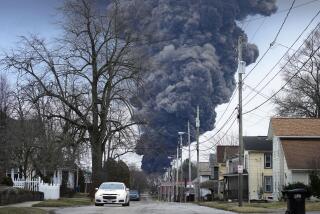Waxman Calls for U.S. to Probe Bhopal Deaths; India Castigates Carbide Report
- Share via
WASHINGTON — A leading House critic of the chemical industry, saying he has “come to the point where I don’t think I can take Union Carbide’s word for what’s happened,” called Friday for a federal inquiry into the causes of the poison-gas tragedy Dec. 3 that killed more than 2,000 persons at the firm’s pesticide plant in Bhopal, India.
The comment, by Rep. Henry A. Waxman (D-Los Angeles), came as the Indian government curtly dismissed as “unjustifiable and unacceptable” a Union Carbide Corp. report suggesting that Indian workers may have been partly responsible for the tragedy.
‘Independent Entity’
“What we need is some independent entity that does not have the same perspective as Union Carbide to make decisions” about the causes of the Bhopal incident, Waxman said. “Even though the Environmental Protection Agency has such a miserable record, perhaps they should be the one.”
In releasing the results of a 2 1/2-month investigation into the Bhopal tragedy, Union Carbide officials said Wednesday that the pesticide plant did not meet safe operating standards Dec. 3, when a runaway reaction spewed deadly gas across the city. The duty to meet the standards, they said, fell upon the plant’s Indian managers.
Other Union Carbide officials suggested that someone “inadvertently or deliberately” triggered the chemical reaction by pumping water into a tank of toxic methyl isocyanate liquid.
‘So-Called Report’
The Indian government, in a statement released by its embassy here, rejected the Union Carbide conclusions as a “so-called report . . . prepared without knowledge of the full facts relating to the tragedy.” The government’s own analysis will be released “in due course,” a spokesman said.
Until an impartial verdict on the Bhopal disaster is reached, Waxman said, Union Carbide should not be allowed to reopen its factory at Institute, W.Va., which was a model for the Bhopal plant. The Institute plant, which also made methyl isocyanate, was closed after the Bhopal disaster but is scheduled to reopen April 1.
At Union Carbide’s Danbury, Conn., headquarters, spokesman Harvey Cobert declined to comment on Waxman’s call for an independent inquiry, saying that the congressman “is entitled to make those statements.”
He said the company this week fulfilled an EPA request for technical data on the safety improvements at the Institute plant “and we feel confident that that material will indicate the effort we have made to further strengthen the safety features at that plant.”
Objectivity Doubted
Waxman said his doubts about Union Carbide’s objectivity are based in part on information gathered for a House Commerce subcommittee hearing, scheduled for Tuesday, which will examine the American chemical industry’s environmental and safety records.
A Waxman aide said the company has “waffled” on what Waxman believes are some key safety issues. Among them are the extent to which the company’s American executives dealt with safety issues at the Bhopal plant and the need for safety improvements at the Institute factory.
Internal memos released earlier by Waxman show that Union Carbide rejected at least one key safety improvement there last year--before Bhopal--as too costly. But company officials say they have made extensive improvements at Institute since the Bhopal incident.
More to Read
Sign up for Essential California
The most important California stories and recommendations in your inbox every morning.
You may occasionally receive promotional content from the Los Angeles Times.










